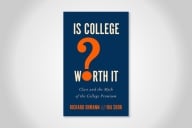You have /5 articles left.
Sign up for a free account or log in.
And if you go chasing rabbits, and you know you're going to fall
Tell 'em a hookah-smoking caterpillar has given you the call … (Grace Slick, 1965)
It’s traditional graduation season, so it’s also the time for articles about the supposed gap between what colleges claim baccalaureate graduates know and can do and what the corporate, nonprofit and government sectors claim they need them to know and do. Higher education’s panicked response to those critiques has too often been to chase rabbits. Unfortunately, the rabbits are usually not innovative, creative curricular redesigns but rather a doubling down on increasingly less relevant and arbitrary collections of credits we call “degrees.”
Perhaps if we paid more attention to Lewis Carroll and Grace Slick, and the similar messages that employers send regarding the centrality of demonstrable skills like clear thinking to the success of their organizations, we would know that chasing rabbits is doomed, a harbinger of reality distorted. We would also have a better answer to the Caterpillar’s simple yet deceptively difficult question: “Who are you?”
Who are we indeed? Those people who expend considerable capital debating “job/career preparation” versus “education for civic and social life” (or some variation of that) as higher education’s raison d’être are missing the central point of the question. First, the answer never was one category or the other (read the exchanges between Benjamin Franklin and the University of Pennsylvania’s trustees for one U.S. historical perspective). Second, the traditional framing of this pseudodebate -- a four-year period during which all the requisite skills and knowledge needed for a happy, successful remainder of one’s life were supposed to be acquired -- is not just quaint, it is dangerous.
Arguably, the higher education version of the Caterpillar’s existential question is a variation of the fact that personal identity -- who we are -- takes a lifetime. So given that education itself is a lifelong endeavor, the fundamental question for higher education today is this: What are the actual building blocks that absolutely must be acquired at the early stages of higher education so that a person is adequately prepared to continuing building on that foundation?
Answering that last question forces a shift in perspective just enough to expose a fundamental absurdity of traditional approaches that focus on degrees and that gives legitimacy to the skills-gap indictment. For instance, most traditional institutions (those not using a competency-based mastery learning model) award baccalaureate degrees to students who complete 120 credit hours, give or take, at a 70 percent or better level of performance (i.e., at a grade of C or better). Set aside the anachronistic notion of a credit hour for the moment and focus on the minimum performance standard. You soon realize that those students who eke by with a 2.0 GPA (and a 30 percent performance gap) are awarded the same degree as those with a 4.0 GPA (minus, perhaps, a Latin-labeled honors notation).
What this says is that, in higher education’s judgment, it is perfectly fine to have not learned 30 percent of the information that the faculty members and professionals in any discipline decided was important enough to know -- such that it was included not just in the course materials, but was actually tested on examinations and other assessments. The degree is awarded anyway. I have asked, but have never received a satisfactory answer to, the question of which 30 percent it is permissible for a civil engineering student not to know, for example, about bridge building.
There are better, more rational, and more effective ways, and we’ve known about and practiced them for a long time. To ensure that those approaches stick this time, we must rid ourselves, once and for all, of at least three illusions (some observers would say delusions:
- that any higher education degree is truly meaningful in and of itself beyond its role as a proxy,
- that time per se is a relevant variable, and
- that it is acceptable to certify a learner who has not acquired core knowledge and/or has never developed core skills deemed essential in that learner’s area(s) of emphasis.
Only then will we (re)discover what we once knew and practiced:
- that learning never stops, so we must recognize the temporary nature of knowledge and skills,
- that the learner is ready when the learner is ready, and
- that only when mastery of knowledge and skills is achieved is the learner (and learning) certified.
Equally important, we must apply these principles by equipping learners with the knowledge and skills they will actually need. Consider this: we hear a mantra that future trajectories for people in the work force will be nonlinear and demand great cognitive, emotional, technical and other forms of flexibility and entrepreneurial skill. Without a curriculum that inculcates such flexibility and entrepreneurship, we are essentially ill equipping (at best) or dooming (at worst) the learners who have come to our institutions for that vaunted “education.” Whether it is the performing arts (e.g., How well are we preparing future musicians for a world of self-promotion as well as excellent playing?) or accounting (e.g., How well are we preparing future accountants to stay one step ahead of AI?), unless we shift to include such flexibility along with critical thinking, computation, data analytics, communication and so forth, we will fail.
Before we chase this rabbit, though, let’s be reflective. Let’s admit it is high time higher education moved on from wondering about the conditions under which learning occurs best -- we have a good handle on that, actually -- and the internecine warfare about which courses count toward the major and which to a random walk model of general education. Let’s move to the much more important matters of achieving consensus on, and the authentic assessment of, core knowledge and skills in every area and providing certification of that assessment to the learner for inclusion in the learner’s eportfolio. Let’s ensure that every learner is prepared to be flexible and entrepreneurial, and explicitly adopt a seamless lifelong learning approach to all higher education.
So committed, we take these steps in full collaboration with the public and private sectors that hire and benefit from the learners we educate. How might this collaboration proceed? I believe the following steps would at least set the stage.
Listen contemplatively and completely. For years, public and private organizations and higher education institutions have been talking past each other chasing rabbits -- adding new majors or concentrations in certain fields and eliminating others, creating “partnerships” with businesses, and so forth, without really taking the time to deeply understand what the real issues are.
Insist on mutual clarity, honesty and hard work. Higher education must complete the work of creating authentic assessments for all the knowledge and skills that it claims are vitally important: critical thinking, data analysis, mathematical reasoning, writing and speaking clarity, and so forth. Likewise, public and private organizations must now be crystal clear on the skills needed by college graduates for success and how those skills map to specific positions over time at all levels. (The latter point would lead naturally to extensions of skills mapping, an already common approach used in those sectors but that is not yet well developed at advanced levels.)
Embed flexibility and entrepreneurship across the curriculum. Creating specialized programs relating to flexibility and entrepreneurship is the worst rabbit of all. Unless such knowledge and skills are embedded all across the curriculum, students and society will be ill served.
Require the collaboration throughout adulthood. Once we have clear and consensus-based agreement on the mapping of knowledge and skills, higher education can work fully collaboratively with the public and private sectors to co-create a lifelong education system that offers learners the opportunity to refresh and advance themselves whenever and wherever needed.
The elements of this approach are not new. What is novel is the goal of creating a truly lifelong learning model that is continuous in conceptualization but discontinuous in practice, and that is not based on arbitrary chunks of time-based learning (in either a direct or a derived sense). Rather, learners attend a higher education institution to gain a certain amount of knowledge and skills, not just for a job but for broader civic engagement as well, with the amount determined through the mutual process described earlier, and they can either pause then or continue. The key point is that wherever and whenever the learner pauses, it is understood that the pausing is temporary.
How does this change the view and role of higher education? First, it eliminates the trope of the so-called skills gap as, by definition, the authentic assessment of knowledge and skills that have been co-developed by a diverse group of experts to eliminate that gap takes care of it, as long as both higher education and the public and private sectors have been honest in their work. Moreover, the acquisition of knowledge and skills essential to the civic good are also clearly articulated and assessed.
Second, the model moves away from the confines (and hegemony) of credits and majors, and eliminates the turf-protecting academic arguments regarding the balance between general education and specialized courses. Importantly, majors as we understand them would phase out in favor of foundational approaches that emphasize cognitive and career flexibility and entrepreneurship -- points that get a great deal of conversation but for which students now get almost no preparation. As both the public and private sectors continue their move away from hiring learners in traditional majors like accounting or business to hiring learners with broader, flexible skills and knowledge, a mapping approach will provide better understanding of what it takes to be successful at work and in society.
There is no doubt that change of this sort is both radical and essential. The longer higher education continues to chase the rabbits, however, the more irrelevant it will become, and the harder it will be to respond not only to the Caterpillar’s but also society’s existential question.








